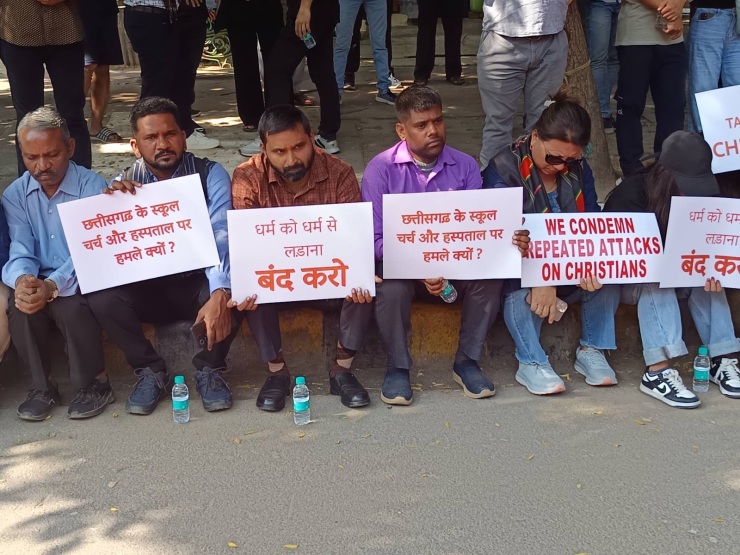
More than 3,000 Christians from various denominations gathered near the Indian Parliament on 26 October to protest what they describe as an alarming surge in violence against their community across the country.
The demonstration, organised by the Delhi-National Capital Region Christian Fellowship, took place at Jantar Mantar, an area specifically designated for public rallies near parliament. The protest brought together church leaders, pastors, nuns, school principals, teachers, doctors, nurses, and lay members of the community who voiced their concerns about what they view as systematic persecution.
Two days before the protest, community leaders and activists held a press conference at the Press Club of India to lay out evidence of what they described as a real and rising threat to their community. The Citizens for Justice and Peace (CJP), a human rights movement, supported their claims by presenting documentation of five distinct incidents of persecution that occurred in just one week between October 13 and 20.
Speaking to Christian Today, Minakshi Singh, the co-convenor of the protest said, “We expected more people to turn up, but many did not out of fear of being identified. Such is the atmosphere in the country. We, however, are happy with the ones that did show up in solidarity with the community and the protest was successful in achieving what we set out for.”
Michael William, president of the United Christian Forum (UCF), revealed during the protest that 585 incidents targeting Christians had been recorded in the first nine months of 2024 alone. According to UCF data, 2023 saw 733 incidents of violence against Christians, averaging 61 incidents monthly. The group has notably excluded from these figures the atrocities against Christians in Manipur, where tribal Christians have faced significant violence during a 17-month-long communal conflict that has claimed over 230 lives.
Nabore Ekka, who heads the Delhi regional unit of a national forum of indigenous people, described at the protest how in typical attacks, “pro-Hindu mobs, supported by police, barge into prayer services and attack the congregation, including priests and pastors.” A. C. Michael, president of the Federation of Catholic Associations of the Archdiocese of Delhi, added that these fringe elements enjoy “a sense of immunity as police and local media accompany them.”
In their memorandum to Prime Minister Narendra Modi, the protesters highlighted that “the targeted violence and hostility appear to be suspiciously more in states ruled by the Bhartiya Janata Party (BJP).” The document details numerous violent incidents across multiple states.
A particularly disturbing case occurred in March 2024, when Christian villagers in Badeproda, Chhattisgarh, were subjected to severe violence. According to the memorandum, they “were brutally assaulted, resulting in severe injuries, including bone fractures, which required hospitalization. Their attackers also destroyed their homes, and their crops.” Despite filing formal complaints, the victims received no police support and were later “attacked again” with some “beaten unconscious.”
The situation has been especially grave for tribal Christians. Since December 2022, there have been systematic attacks displacing Adivasi Christians in Chhattisgarh. In one harrowing incident detailed in the memorandum, “on January 2, 2023, three Adivasi Christian women in Narayanpur were stripped naked publicly and physically assaulted in a bid to force them to give up their Christian faith.”
The protesters expressed particular concern about the misuse of anti-conversion laws. Research cited in the memorandum reveals that these laws have been “weaponized to target religious minorities.” The document notes that “false cases linger for many years, and the police and mob brutality against Christians accused under the anti-conversion laws and growing legal costs all result in undue violation of the right to life and liberty.”
A striking pattern has emerged in the enforcement of these laws. The memorandum cites that in Ghaziabad alone, “four FIRs were filed under the Anti-Conversion Law within a span of just 10 days, from September 22 to October 1, 2024.” In many cases, complaints are being filed by third parties without direct involvement in the alleged conversions.
The protesters submitted several recommendations to the government, including calls for the repeal of anti-conversion laws, proper compensation for victims, and enhanced training for law enforcement. Their memorandum emphasizes that “the continuing violence and hostility have instilled a sense of fear and insecurity among Christian citizens, hampering their ability to practice their faith freely.”
The protest leaders, representing India's Christian minority that comprises approximately 2.3 percent of the country's 1.4 billion population, are demanding immediate government intervention. The memorandum, signed by over 100 Christian leaders including bishops, archbishops, reverends, and community activists, concludes that these documented incidents represent only a fraction of the persecution faced by their community.
In a particularly pointed observation, the memorandum notes that while India wishes to project itself as a forward-looking democracy, the “restrictions placed on the citizens as regards freedom of belief and religion” suggest a concerning regression in constitutional freedoms.
The demonstration concluded with the formal submission of the memorandum to the Prime Minister's Office. Among the signatories were Archbishop Anil J T Couto, Bishop Paul Swarup, Archbishop Mar Demetrius, Bishop Thomas Mar Anthonis, Bishop Subodh Mondal, Archbishop Bharnikulangara, Bishop Deepak V Tauro, Bishop Karam Masih, Rev. Richard Howell and Rev. Vijayesh Lal, alongside dozens of reverends, pastors, and community activists. A delegation of protesters appointed Mr. A C Michael as the contact person for any future correspondence regarding their demands. The organisers indicated that they would continue to pursue legal and democratic means to address their concerns, including following up with various government departments and human rights bodies.




